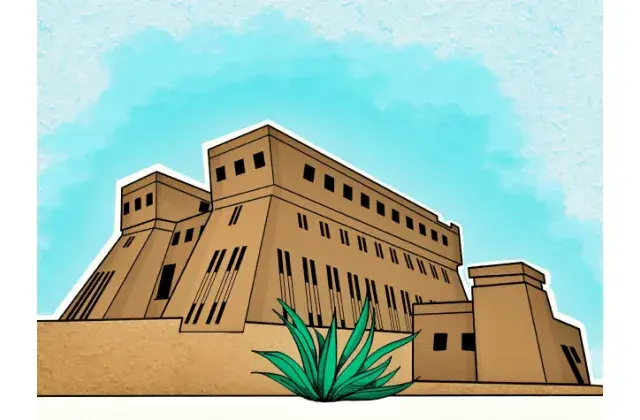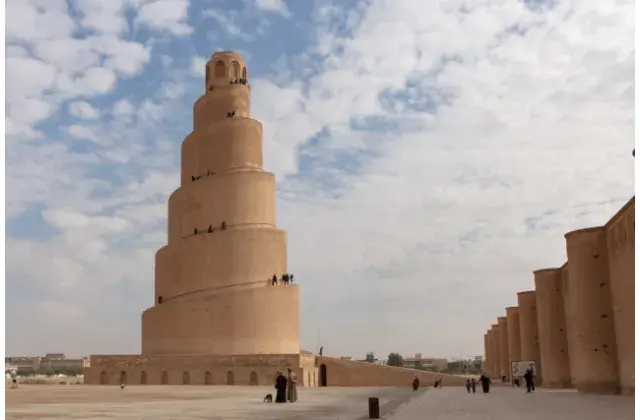Basra City: The station of the flourishing of Arabic literature

The city of Basra is one of the most important centers of literature and culture in the Arab world and has contributed greatly to shaping the literary scene throughout the ages.
Since the founding of this ancient city in 14 AH (636 AD), Basra has become an important strategic and commercial center and quickly turned into a beacon of science and culture and one of the most important cities in the Islamic world in terms of knowledge production. It also attracted scholars from all over the world to exchange ideas and develop various sciences.
The city of Basra is also the cradle of grammar, where a great grammar school was established that greatly influenced the unification of grammar rules, making the Arabic language a strong and robust language that can withstand the changes of time.
One of the most famous grammarians who founded this school is "Sibawayh", who is considered one of the greatest grammarians in Arab history and his famous book "Al-Kitab" is still the most important reference in Arabic grammar rules to this day. Sibawayh was born and raised in a fertile scientific environment in the city of Basra, and was influenced by the scholars who preceded him and continued his journey in developing the sciences of language.
We cannot talk about the city of Basra without mentioning Al-Khalil bin Ahmed Al-Farahidi, the linguist who invented the science of prosody and wrote the first Arabic dictionary, "Kitab Al-Ain". This book is considered one of the most prominent landmarks in the history of Arabic literature, as it contributed to documenting the language and its development in a manner that suits the development of literature and culture.
In the journey of exploring the notables of Basra, Al-Asma'i stands as one of its prominent symbols, as Al-Asma'i was known for his extreme accuracy in the Arabic language and played a role in preserving the poetic and linguistic heritage of the Arabs. He is famous for his book "Fuhool Al-Shu'ara" in which he collected the poems of the great Arab poets.
Basra was also an incubator for poetic creativity, as many poets lived there who influenced Arabic poetry. The culturally diverse environment of Basra gave poets space to express themselves in new and innovative ways.
The poet Bashar bin Burd is one of the most famous native poets of Basra. This poet overcame his physical disability and emerged as one of the greatest poets of the Abbasid era. Bashar was known for his poetry that combined love and satire, in which he addressed social and political issues in a bold and direct language that led to his death. Al-Jahiz said about him: "There is no village poet on earth whose poetry is considered modern except that Bashar is more poetic than him."
In the field of prose literature, we cannot ignore mentioning Al-Jahiz, one of the greatest Arab writers who lived in Basra. Al-Jahiz had a unique ability to combine humor and intellectual depth, and left us a huge literary legacy containing writings in various fields such as theology, literature, politics, history, ethics, plants, animals, and others. Among his most famous works is "Al-Bukhala", which is considered a masterpiece of social satire, and his book "Al-Hayawan", which combines science and literature in a distinctive style.
In addition to literature and poetry, Basra was a center of science and knowledge, where scholars from various fields met and formed scientific circles for discussion and exchange of ideas. The city of Basra contained huge libraries containing treasures of books and manuscripts collected from all over the world, which made it a destination for scholars and researchers.
Basra is home to many writers and thinkers who contributed to the development of various sciences such as astronomy and physics, such as Al-Hasan Ibn Al-Haytham. This thriving scientific environment gave writers and poets a great opportunity to draw from multiple sources, which enriched their literary production and raised the level of culture in the city.
Basra's influence was not limited to its geographical borders, but rather spread throughout the Arab world.
Basra exported writers and scientists to various countries, where they contributed to spreading knowledge and developing Arabic literature in various Islamic cities. Basra also became a bridge linking the Arab heritage with other world literatures, as writers and thinkers exchanged ideas and texts through it, which helped in the development of Arabic literature significantly.
The literary legacy of the city of Basra did not stop, but rather continued to this day, and despite the challenges that the city faced throughout history, whether in terms of wars and social crises, Basra maintained its position as a center for literary creativity, which confirms that the literary legacy of Basra is a living and ongoing legacy.
This city is not just an ancient historical city, but rather a symbol of Arab and Iraqi civilization and literary creativity from grammar to poetry and from literature to science, as Basra contributed to building a rich and diverse literary heritage that is still celebrated today. The great literary heritage of the city of Basra is evidence that cities are not just geographical places, but rather homelands of thought and creativity.
Author: Abdullah Al-Abdullah (Iraqi Al-Firdaws Association)
This content is licensed under a Creative Commons CC BY-NC 4.0 license.





